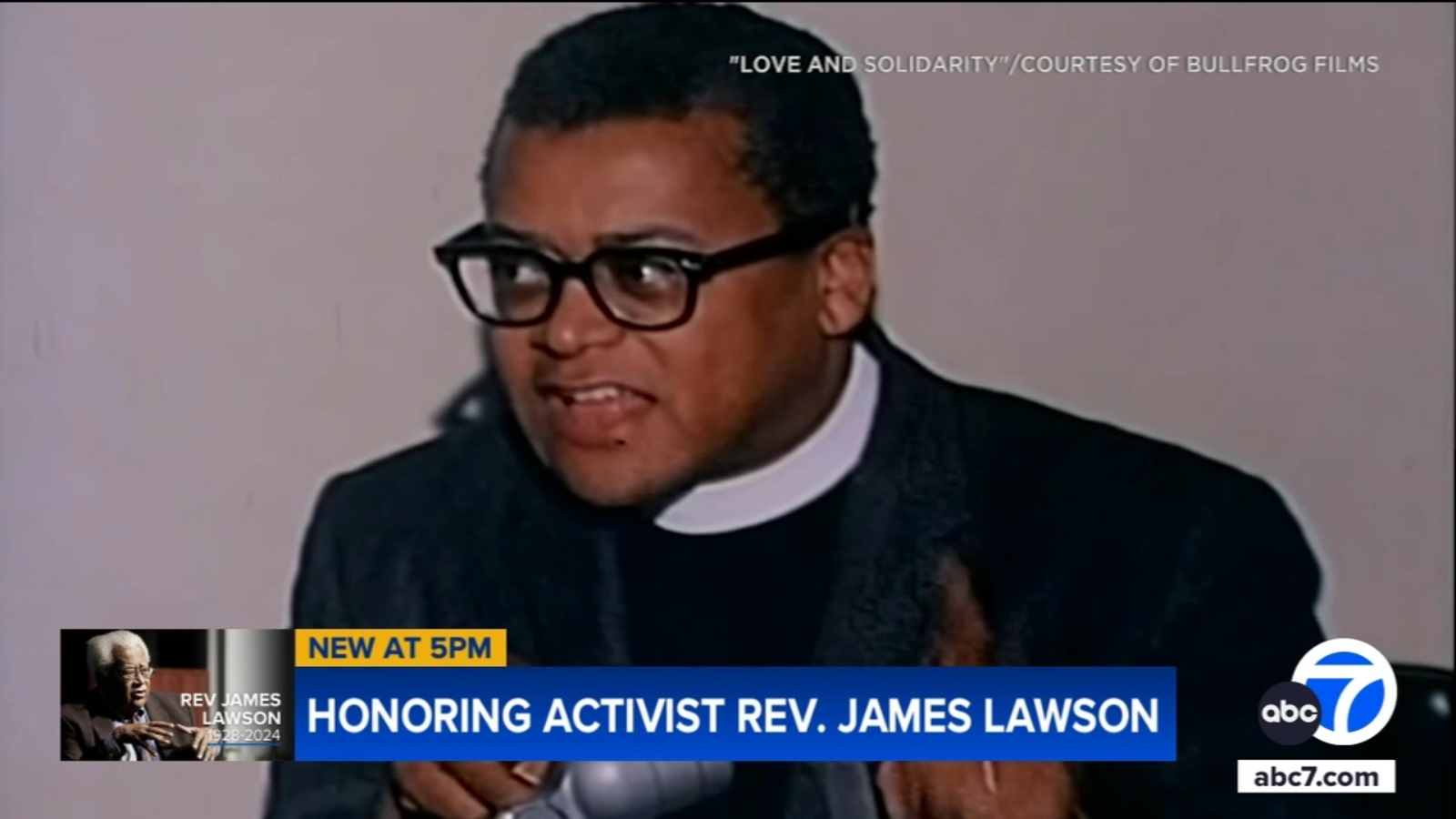SOUTH LOS ANGELES (CNS) — A packed church of community leaders and worshippers paid tribute Saturday to the late Rev. James Lawson Jr., a local civil rights icon who died last month at age 95.
Lawson was the longtime pastor of Holman United Methodist Church, 3320 W. Adams Blvd., in South Los Angeles, where Saturday’s memorial service was held.
“Today we come together to celebrate the life of a great man,” Los Angeles Mayor Karen Bass said. “He dedicated his life to equality and justice and helped develop generations of leaders, including the Rev. Martin Luther King Jr..”
Bass also said Lawson was an inspiration to his career in public service, noting that they helped found the Youth Coalition to fight the crack cocaine epidemic in the 1980s.
Several other speakers, including former Los Angeles City Councilman and County Supervisor Mark Ridley-Thomas and author and historian Jon Meacham, also praised Lawson’s friendship and teachings of nonviolence.
Lawson died in Los Angeles on June 9 after a short illness. His passing drew tributes from across the nation, including from President Joe Biden.
Democratic Sen. Maria Elena Durazo of Los Angeles said her political career has taught her that many people have “more power than courage,” but that Lawson’s life was a lesson in what people can accomplish with “courage rather than power.”
Meacham, who wrote a 2020 biography of the late civil rights leader and longtime Georgia congressman John Lewis, called Lawson “one of the most important Americans, one of the most important men of this or any other era” for his contributions to the civil rights movement of the 1960s, saying he “deserves as much respect as Washington or Jefferson.”
Lawson died in Los Angeles on June 9 after a short illness. His passing drew tributes from across the nation, including from President Joe Biden.
“Jill and I are mourning the loss of one of our nation’s most noble leaders,” Biden said in a statement after his death. “His passing just before June 19th reminds us that our nation’s journey from slavery to freedom began in the hearts of people like James Lawson, whose fascination with freedom was intense. My condolences go out to the Lawson family as the nation mourns a man who helped save the soul of our nation.”
Lawson served as pastor of Holman United Methodist Church from 1974 until his retirement in 1999. The one-mile section of Adams Boulevard from Crenshaw Boulevard in front of the church to Arlington Avenue was named “The Rev. James Lawson Mile” in January.
He was born James Morris Lawson Jr. on September 22, 1928, in Uniontown, Pennsylvania, the son and grandson of a Methodist minister, and grew up in Massillon, Ohio.
Lawson was drafted into the U.S. Army while a student at Baldwin Wallace College in Berea, Ohio, but refused military service due to his nonviolent beliefs and was sentenced to two years in prison.
Released after 13 months, Lawson returned to college to finish his studies and then traveled to Nagpur, India as a Methodist missionary to study the tactics of nonviolent resistance developed by Mahatma Gandhi.
Lawson returned to the United States in 1956 and enrolled at Oberlin College’s Graduate School of Theology in Ohio. One of Lawson’s professors introduced him to Martin Luther King, Jr., who was an adherent of Gandhi’s principles of nonviolent resistance, according to a biography by the Stanford University-based Martin Luther King Jr. Institute.
In 1957, Dr. King encouraged Lawson to move to the South, saying, “Come on, there’s no one like you in the South. He moved to Nashville, Tennessee, and enrolled at Vanderbilt University, where he began teaching methods of nonviolent protest.
Following a student-initiated lunch counter sit-in at a Woolworth store in Greensboro, North Carolina, in February 1960, Lawson and several local activists launched a similar protest at a store in downtown Nashville. More than 150 students were arrested before city leaders agreed to desegregate some of the lunch counters.
Lawson was expelled from Vanderbilt University in March 1960 for his involvement in the Nashville desegregation movement. He eventually reconciled with Vanderbilt and returned to teach as a distinguished professor at the university. Vanderbilt established an Institute for the Study and Research of Nonviolent Movements in his name in 2021.
Lawson took part in the 1961 Freedom Rides which challenged racial segregation on interstate buses and bus terminals.
Lawson became pastor of Centenary Methodist Church in Memphis, Tennessee, in 1962. In 1968, when black sanitation workers in Memphis went on strike for higher wages and union recognition after two co-workers were crushed to death in an accident, Lawson served as chairman of the strike committee.
Lawson and King led a demonstration in support of the strikers on March 28, 1968, but it was quickly called off when violence broke out.
In his final speech on April 3, 1968, the day before he was assassinated, King praised Lawson as one of the “noble men” who inspired the black liberation movement.
“He went to prison for his fight, he was expelled from Vanderbilt University for his fight, but he continues to fight for the rights of his people,” King said.
Copyright 2024, City News Service, Inc.
Copyright © 2024 City News Service, Inc. All rights reserved.

